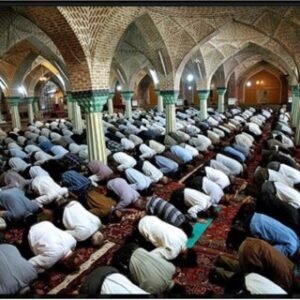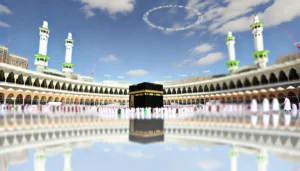Surah Al-Fatiha, the opening chapter of the Quran, holds a significant place in Islamic teachings. It is often referred to as the “Essence of the Quran” and is recited in every unit of the Muslim prayer (Salah). This article provides a comprehensive tafseer (interpretation) of Surah Al-Fatiha, exploring its profound lessons and reflections, supported by Quranic and Hadith evidences.
Text and Translation of Surah Al-Fatiha
- بِسْمِ اللَّهِ الرَّحْمَـٰنِ الرَّحِيمِ
In the name of Allah, the Most Gracious, the Most Merciful. - الْحَمْدُ لِلَّهِ رَبِّ الْعَالَمِينَ
[All] praise is [due] to Allah, Lord of the worlds – - الرَّحْمَـٰنِ الرَّحِيمِ
The Most Gracious, the Most Merciful, - مَالِكِ يَوْمِ الدِّينِ
Sovereign of the Day of Recompense. - إِيَّاكَ نَعْبُدُ وَإِيَّاكَ نَسْتَعِينُ
It is You we worship and You we ask for help. - اهْدِنَا الصِّرَاطَ الْمُسْتَقِيمَ
Guide us to the straight path – - صِرَاطَ الَّذِينَ أَنْعَمْتَ عَلَيْهِمْ غَيْرِ الْمَغْضُوبِ عَلَيْهِمْ وَلَا الضَّالِّينَ
The path of those upon whom You have bestowed favor, not of those who have evoked [Your] anger or of those who are astray.
Lessons from Surah Al-Fatiha
- Invocation of Allah’s Name (Verse 1)
Surah Al-Fatiha begins with the phrase “In the name of Allah, the Most Gracious, the Most Merciful,” which signifies the importance of seeking Allah’s blessings and mercy in all actions.
Quranic Evidence:
“وَقُلْ رَبِّ أَعُوذُ بِكَ مِنْ هَمَزَاتِ الشَّيَاطِينِ”
_”And say, ‘My Lord, I seek refuge in You from the incitements of the devils.'”
(Quran 23:97)
Hadith Evidence:
“قَالَ رَسُولُ اللَّهِ ﷺ: كُلُّ أَمْرٍ ذِي بَالٍ لَا يُبْدَأُ فِيهِ بِبِسْمِ اللَّهِ فَهُوَ أَبْتَرُ”
“The Messenger of Allah (ﷺ) said: ‘Every important matter that does not begin with the name of Allah is cut off.'”
- Praise and Gratitude to Allah (Verse 2)
This verse teaches the importance of praising and showing gratitude to Allah for His countless blessings.
Quranic Evidence:
“فَاذْكُرُونِي أَذْكُرْكُمْ وَاشْكُرُوا لِي وَلَا تَكْفُرُونِ”
“So remember Me; I will remember you. And be grateful to Me and do not deny Me.”
(Quran 2:152)
Hadith Evidence:
“قَالَ رَسُولُ اللَّهِ ﷺ: مَنْ لَمْ يَشْكُرِ النَّاسَ لَمْ يَشْكُرِ اللَّهَ”
“The Messenger of Allah (ﷺ) said: ‘He who does not thank the people is not thankful to Allah.'”
- Acknowledging Allah’s Mercy (Verse 3)
This verse highlights the boundless mercy of Allah, which is a recurring theme throughout the Quran.
Quranic Evidence:
“وَرَحْمَتِي وَسِعَتْ كُلَّ شَيْءٍ”
“My mercy encompasses all things.”
(Quran 7:156)
Hadith Evidence:
“قَالَ رَسُولُ اللَّهِ ﷺ: إِنَّ اللَّهَ كَتَبَ كِتَابًا قَبْلَ أَنْ يَخْلُقَ الْخَلْقَ إِنَّ رَحْمَتِي سَبَقَتْ غَضَبِي”
“The Messenger of Allah (ﷺ) said: ‘Indeed, Allah wrote in a book before He created the heavens and the earth: My mercy prevails over My wrath.'”
- Recognition of Allah’s Sovereignty (Verse 4)
Acknowledging Allah as the Sovereign of the Day of Judgment reminds believers of their accountability and the ultimate justice of Allah.
Quranic Evidence:
“مَالِكِ يَوْمِ الدِّينِ”
“Sovereign of the Day of Recompense.”
(Quran 1:4)
Hadith Evidence:
“قَالَ رَسُولُ اللَّهِ ﷺ: الْكَيِّسُ مَنْ دَانَ نَفْسَهُ وَعَمِلَ لِمَا بَعْدَ الْمَوْتِ”
“The Messenger of Allah (ﷺ) said: ‘The wise man is the one who calls himself to account and refrains from doing evil deeds and does noble deeds to benefit him after death.'”
- Exclusive Worship and Seeking Help from Allah (Verse 5)
This verse emphasizes the monotheistic belief in Islam, where worship and seeking help are directed solely to Allah.
Quranic Evidence:
“وَمَا خَلَقْتُ الْجِنَّ وَالْإِنسَ إِلَّا لِيَعْبُدُونِ”
“And I did not create the jinn and mankind except to worship Me.”
(Quran 51:56)
Hadith Evidence:
“قَالَ رَسُولُ اللَّهِ ﷺ: إِذَا سَأَلْتَ فَاسْأَلِ اللَّهَ وَإِذَا اسْتَعَنْتَ فَاسْتَعِنْ بِاللَّهِ”
“The Messenger of Allah (ﷺ) said: ‘If you ask, ask Allah; if you seek help, seek help from Allah.'”
- Guidance to the Straight Path (Verse 6)
Seeking guidance from Allah is essential for living a righteous life that aligns with His will.
Quranic Evidence:
“وَمَن يَهْدِ اللَّهُ فَمَا لَهُ مِن مُّضِلٍّ ۗ أَلَيْسَ اللَّهُ بِعَزِيزٍ ذِي انتِقَامٍ”
“And whomever Allah guides – for him there is no misleader. Is not Allah Exalted in Might and Owner of Retribution?”
(Quran 39:37)
Hadith Evidence:
“قَالَ رَسُولُ اللَّهِ ﷺ: إِنَّهُ لَمْ يَكُنْ نَبِيٌّ قَبْلِي إِلَّا كَانَ حَقًّا عَلَيْهِ أَنْ يَدُلَّ أُمَّتَهُ عَلَى خَيْرِ مَا يَعْلَمُهُ لَهُمْ”
“The Messenger of Allah (ﷺ) said: ‘There was no prophet before me but he had the duty of guiding his followers to what he knew was good for them.'”
- The Path of the Righteous (Verse 7)
This verse distinguishes between those who have earned Allah’s favor and those who have gone astray, encouraging believers to follow the path of righteousness.
Quranic Evidence:
“فَإِنَّهَا لَا تَعْمَى الْأَبْصَارُ وَلَـٰكِن تَعْمَى الْقُلُوبُ الَّتِي فِي الصُّدُورِ”
“For indeed, it is not eyes that are blinded, but blinded are the hearts which are within the breasts.”
(Quran 22:46)
Hadith Evidence:
“قَالَ رَسُولُ اللَّهِ ﷺ: تَرَكْتُ فِيكُمْ أَمْرَيْنِ لَنْ تَضِلُّوا مَا تَمَسَّكْتُمْ بِهِمَا: كِتَابَ اللَّهِ وَسُنَّةَ نَبِيِّهِ”
“The Messenger of Allah (ﷺ) said: ‘I have left behind two things, you will never go astray as long as you hold onto them: the Book of Allah and the Sunnah of His Prophet.'”
Quranic and Hadith References:
- Quran: Surah Al-Fatiha (1:1-7), Surah Al-Baqarah (2:152), Surah Al-A’raf (7:156), Surah Adh-Dhariyat (51:56), Surah Az-Zumar (39:37), Surah Al-Hajj (22:46)
- Hadith: Sahih Muslim, Sahih Bukhari








